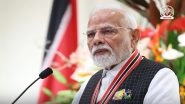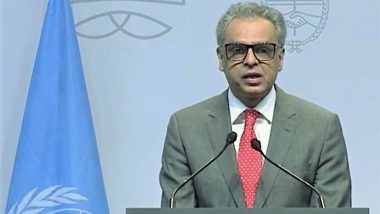United Nations, May 8: With peacekeeping operations trapped in a "no-man's land" of vague realities and expectations, India says there has to be a readiness to adapt to the emerging threat situations. India's Permanent Representative Syed Akbaruddin told the Security Council on Tuesday, "Peacekeeping today is in the domain of a vaguely defined no-man'sland. It lies somewhere between trying to keep the peace in fragile environments and trying to enforce the maintenance of peace, where there is none to keep". UN Owes India $38 Million for Peacekeeping Operations: Antonio Guterres.
Under these circumstances, he said, "Responses to new security environments cannot be by merely ratcheting up traditional methodologies. They require a willingness to adapt abilities to meet emerging realities".
Specialised units like field hospitals, engineering and signal companies already deployed in missions can provide training to core groups to enhance their capacities, he said at a Council debate on training for peacekeeping.
He said that India shares its peacekeeping experience with others to help build their capacities and an example of it was a co-deployment initiative with Kazakhstan in the UN Interim Force in Lebanon (UNIFIL), he said.
India recently held a field training exercise on UN peacekeeping with 18 African countries, he added. India's Centre for UN Peacekeeping (CUNPK) conducts international courses for observers and various officers, he said.
Akbaruddin said that training was required to ensure safety and security in difficult environments. During the debate safety of the blue helmets was emphasised. Secretary-General Antonio Guterres said that with the growing threat from improvised explosive devices and other dangers, the UN is working with countries that provide troops and police to ensure that their personnel have undergone the required training.
He said that in the five high-risk missions the UN has conducted training support visits. "We are also instituting casualty evacuation training, stress testing and crisis management exercises in these five missions", he said.
Indian troops are deployed in two of them, MONUSCO in the Democratic Republic of Congo where 16 Indian peacekeepers have died, and UNMISS in South Sudan, which has claimed 10 Indian lives. UN Chief Antonio Guterres 'Concerned' Over Deaths of Two Indian Journalists.
Indonesia's Foreign Minister Retno Marsudi, who presided over the meeting said that safety and performance of the blue helmets were endangered by the changing nature of conflicts. The involvement of transnational actors including foreign terrorist fighters was one of the factors heightening risks to the peacekeepers, she said.
She said that to meet these challenges, better consultation between the Council, host countries, personnel contributing countries, and the Secretariat was required to ensure better synergy between mandates, actual needs on the ground, and training".
(The above story first appeared on LatestLY on May 08, 2019 09:49 AM IST. For more news and updates on politics, world, sports, entertainment and lifestyle, log on to our website latestly.com).













 Quickly
Quickly


